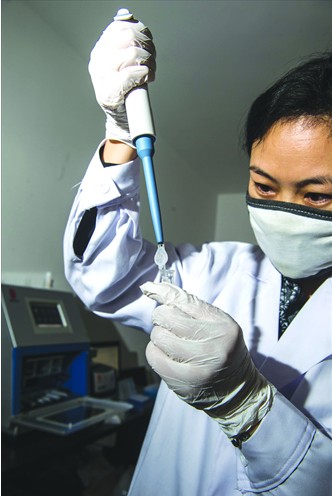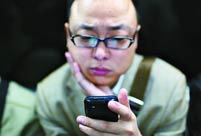 |
| A geneticist extracts a sample of saliva for testing. More Chinese companies are selling kits that test customers' DNA to reveal whether they are at risk of hereditary diseases. Photo: Li Hao/GT |
When Kathy Wang (pseudonym), 30, suffered her third fall within five months in October, she began to worry something might be seriously wrong with her health.
"I was walking normally when my legs just gave in and I collapsed," she said of her most recent fall. "The first two falls weren't that serious, but the third one was severe."Wang went to the Affiliated Drum Tower Hospital at Nanjing University in Jiangsu Province to find out the cause of her mysterious falls. Using little more than a sample of her blood, doctors were able to analyze Wang's genetic makeup, diagnose her condition and put her on the path to treatment.
Genetic testing is used to identify changes in chromosomes, genes and proteins. Results of a genetic test can confirm or rule out a suspected genetic condition or help determine a person's chance of developing or passing on a genetic disorder.
It created international headlines in May when Hollywood star Angelina Jolie announced she had undergone a preventive double mastectomy after doctors found a mutated gene put her at high risk of breast cancer.
In China, genetic testing is being used for clinical purposes at a select number of hospitals and genetic testing companies operating commercial services. But uncertainties over its regulation and overall effectiveness in developing new drugs mean it still has a long way to go before it becomes a norm in national healthcare.

 Fire guts 22-storey Nigeria commercial building in Lagos
Fire guts 22-storey Nigeria commercial building in Lagos U.S. Navy Carrier Strike Group stages military exercises
U.S. Navy Carrier Strike Group stages military exercises Volkswagen showcases new energy vehicles in Beijing
Volkswagen showcases new energy vehicles in Beijing  How should we get married nowadays?
How should we get married nowadays?  Commentary:
Commentary: Jakie Chan sees Rubber Duck off in Beijing
Jakie Chan sees Rubber Duck off in Beijing Hello! Horror Halloween Celebration!
Hello! Horror Halloween Celebration!  The catwalk to the world of fashion
The catwalk to the world of fashion  Cruise trip to Taiwan
Cruise trip to Taiwan  Unveil PLA air force base
Unveil PLA air force base  Say goodbye to tube-like apartment building
Say goodbye to tube-like apartment building Oriental education or western education?
Oriental education or western education? China in autumn: Kingdom of red and golden
China in autumn: Kingdom of red and golden National Geographic Traveler Photo Contest
National Geographic Traveler Photo Contest Chinese screen goddesses from Beijing Film Academy
Chinese screen goddesses from Beijing Film Academy Day|Week|Month